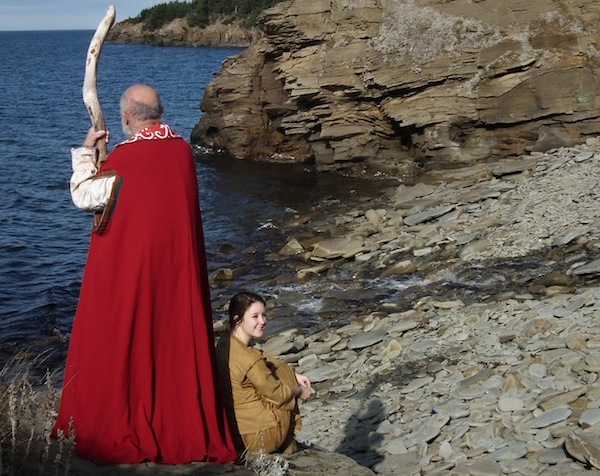
The play, the first of the Cape Breton University Dramagroup’s current season, has three more public performances (Friday, December 2, and Saturday, December 3, at 7 pm, and Sunday, December 4, at 2 pm) after a week of morning performances for area high school students.
I attended the Tuesday morning performance and, along with the students from New Waterford and Glace Bay, was amazed at the flawless, epic production values and the energetic and kinetic performances of the large cast.
The Tempest is an odd child in the Shakespeare canon: an audience favorite for its unique blend of magic, romance, and ribaldry, immensely quotable (“We are such stuff/As dreams are made on”), and full of bold, unforgettable characters: Prospero, both wronged duke and powerful mage; Ariel, a less puckish Puck; Caliban, the misbegotten “moon calf”.
But unlike its sibling play, A Midsummer Night’s Dream, there is almost no plot, and very little forward character development: by the end of the play, circumstances change but hardly any of the characters. It’s all froth–magical froth, fun and frolicsome froth, and Shakespeare, through Prospero, even admits as much (“These our actors,/As I foretold you, were all spirits and/Are melted into air, into thin air”).
But the stakes seem real enough. Twelve years before the action of the play, Antonio, Prospero’s brother, conspired with the Queen of Naples, to oust Prospero from his throne as Duke of Milan. Cast adrift on the open sea with his toddler daughter, Miranda, Prospero and his books of magic make shore on an island inhabited by sprites, like Ariel, and ogres, like Caliban.
When all the people who wronged are shipwrecked, by his magic, Prospero seems ready to exact his revenge until Miranda falls for the Queen’s son, Ferdinand; sure he is the first young man she’s ever seen in her entire life, but, luckily, he’s handsome, honourable, and sensitive (if he was a sparkly vampire, he’d be perfect).
There is some talk of Antonio and the Queen’s brother, Sebastian, doing in the Queen to take her throne, and a couple of ne’er do wells, Stephano and Trinculo, band together to take on Prospero for control of the island, but, since this is the closest thing to a date movie Shakespeare ever wrote, it’s hard to take either plot seriously.
That said, this Tempest is one of the strongest and most engaging of the Dramagroup’s history.
Director Sharplin has an inventive visual style that sharpens Shakespeare’s poetry: while Prospero describes to Miranda how he was deposed, the scene is acted out in shadow snapshots on the scrim behind him, the ship carrying his enemies breaks apart to become moveable set pieces representing Caliban’s cave, Prospero’s cell, and various locations on the enchanted isle (the cleverly designed set was created by set designer and master builder, Aaron Acosta).
There is always something visually interesting: the fall down slapstick of Caliban, Stephano, and Trinculo, the mischievous pranks of Ariel and her sister sprites, an interlude that features a musical and video intertwining of three of the founding cultures of Cape Breton: Mi’kmaq, French, and Gaelic.
The anchor of the show is John Lingard’s majestic performance as Prospero: wronged and abandoned, Lingard allows his Prospero a mighty anger but, with the natural innocence of his daughter to temper his need for vengenance. As Miranda, Breagh Ross melded a wide-eyed innocence with a kind of feisty toughness, just as the daughter of Prospero would be.
Ciaran MacGillvray (of The Cottars) was a dashing Ferdinand and showed a deft hand at physical comedy. Lindsay Thompson as his mother, Queen Alsonsa (originally a male part), was regal in her grief. Hugh Toner gave his Gonzalo an antic physicality that did not diminish his nobility.
Mark Delaney as the strutting, poisonous Antonio, and Allison Cann as the dim, but equally poisonous Sebastian, were a perfectly matched pair of well-played villains: easy to dislike as characters, hard to take seriously as real threats.
Jeff Ward as Trinculo and Amber Cragg as Stephano were the comedic highlight of the production. Ready to take any pratfall in stride, by turns full of braggadocio and cowardice, they were a favorite of their teenaged audience.
Eric Letcher did Caliban without any of the monstrous make-up usually used to create the misbegotten “moon calf”. He spoke with a French accent that hinted at the racism of New World colonialism, but for the most part it was Letcher’s immensely physical performance that convinced the audience of his ogreness.
Victoria Lanoe was a very sweet Ariel, if somewhat mischevious, and has a beautifully pure singing voice that made her several songs a delight to listen to. She gave a spritely performance as did her four fellow spirits: Danielle MacDonald, Sarah Morrison, Caitriona MacMullin, and Lauren Turner.
Sajive Kochhar and Walter Carey were also hugely effective in the two smaller roles of the seamen on the Queen of Naples ship.
Behind the scenes, special mention must be made of Paula Muise’s superb costumes: the Queen had a beautifully tailored gown, the spirits wore what looked like the buckskins of Cape Breton’s first peoples, and the men’s costuming looked fresh out of the late 1600’s.
And the huge stage crew under the direction of Stage Manager Ida Marie Steeves did a perfect job of keeping the show moving without a bump.
The Tempest is a great start to the Dramagroup’s current season.

